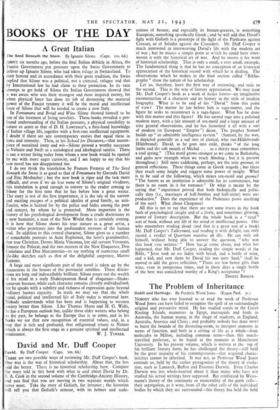David and Mr. Duff Cooper
David. By Duff Cooper. (Cape. los. 6d.)
THERE are two possible ways of reviewing Mr. Duff Cooper's book. One way is the way of historical scholarship. About that, the less said the better. There is no historical scholarship here. Compare the story told in this book with what is said about David by Dr. S. A. Cook in the second volume of the Cambridge-Ancient History, and you find that you are moving in two separate worlds which never meet. Take the story of Goliath, for instance ; the historian will tell you that Goliath's armour, with its helmet and scale-
cuirass of bronze, and especially its bronze-greaves, is something European, something specifically Greek ; and he will add that David's fight with Goliath is a prototype of the fight of the Parthians against Crassus, or of Saladin against the Crusaders. Mr. Duff Cooper is much interested in interweaving David's life with the modern art
of war ; but he misses a simple point at which he could have inter- woven it with the historical art of war. And he misses it for want of historical scholarship. That is only a small, a very small, example. The fundamental thing is that he has no conception of an historical appreciation of the historical record with which he is dealing. The observations which he makes in the final section called " Biblio- graphy " show the nature of his scholarship.
Let us, therefore, leave the first way of reviewing, and turn to the second. This is the way of literary appreciation. We may treat Mr. Duff Cooper's book as a work of belles lettres—an imaginative reconstruction of a character and its history in the style of modern biography. What is to be said of his " David " from this point of view? The matter he has before him is saga-matter, and the figure he seeks to reconstruct is a saga-figure. What has he done with this matter and this figure? He has turned saga into a polished modern story, with a fair amount of sex-motif and a large amount of trite general observations, and he has furnished it all with a sort of modern (or European " Empire ") decor. The prophet Samuel builds up " an admirable intelligence system." (Samuel, by the way, is depicted generally as a sad sort of clerical, who out-Hildebrands Hildebrand). David, as he goes into exile, thinks " of the long limbs and the soft mouth of Michal . . . as a thirsty man remembers a cool spring." (This motif grows stronger as we come to Bathsheba, and gains new strength when we reach Abishag • but it is present throughout.) Still more saddening, perhaps, are the trite gnomai, or general reflections. These things come in Greek tragedy ; but there they reach some height and suggest some power of insight. What is to be said of the following, which mixes sex-motif and gnome? "The harem as an institution is admirable for its convenience, but there is no room in it for romance." Or what is meant by the saying that " experience proved that both biologically and politi- cally they (i.e., marriages of half-brother and half-sister) were un- productive." Does the experience of the Ptolemies prove anything of the sort? 'What about Cleopatra?.
All this is not to say that there are not some traces in the book both of psychological insight and of a lively, and sometimes glowing, power of literary description. But the whole book is a " tired" sort of book, without any lift of the mind or intellectual power. One who remembers reading aloud (and that is a great test of a book) Mr. Duff Cooper's Talleyrand, and reading it with delight, can only record a verdict of Quantum mutatus ab illo. . He can only ask himself, without being able to answer the question, " why was this book ever written? " How has..if come about, and what has happened, that Mr. Duff Cooper, reading the simple words of the Bible, " Jesse took an ass laden with bread, and a bottle of wine, and a kid, and sent them by David his son unto Saul," shall be moved to add the grave reflection, "There arc few better gifts than wine, even in prosperous times, and in those days a single bottle of the best was considered worthy of a King's acceptance "?
ERNEST BARKER.


























 Previous page
Previous page